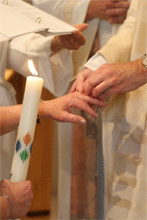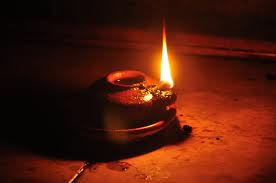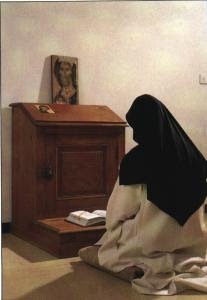[[[Hi Sister Laurel, is the problem of fraudulent hermits a big one? Do many people claim to be Catholic hermits when they are not? I am asking because you have written recently about the normative character of c 603 vocations and some who pretend to be Catholic hermits. Was the Church concerned with frauds and people like that when they decided to create this canon?]] (redacted)
 No, on the whole this is not really a huge problem, or at least it was not a problem when I first started the process of becoming a diocesan hermit. I don't think it is that much of a problem even now though I do hear (or know firsthand) of cases here and there of folks who pull on a habit (or the gaunt visage and behavior of a supposed "mystic"), don the title "Catholic hermit" and then turn up on the doorstep of a parish expecting to be recognized and known in this way. There was also a website a couple of years ago using the names of legitimate (canonical) diocesan hermits to get money through paypal without the knowledge of these same diocesan hermits. Part of the problem is that the authentic vocation is so rare and little-understood in absolute terms that a handful of counterfeits or frauds can have a greater impact relatively speaking. Those disedifying and fraudulent cases aside, however, the origins of the canon are actually pretty inspiring and had nothing to do with frauds or counterfeits. To reprise that here:
No, on the whole this is not really a huge problem, or at least it was not a problem when I first started the process of becoming a diocesan hermit. I don't think it is that much of a problem even now though I do hear (or know firsthand) of cases here and there of folks who pull on a habit (or the gaunt visage and behavior of a supposed "mystic"), don the title "Catholic hermit" and then turn up on the doorstep of a parish expecting to be recognized and known in this way. There was also a website a couple of years ago using the names of legitimate (canonical) diocesan hermits to get money through paypal without the knowledge of these same diocesan hermits. Part of the problem is that the authentic vocation is so rare and little-understood in absolute terms that a handful of counterfeits or frauds can have a greater impact relatively speaking. Those disedifying and fraudulent cases aside, however, the origins of the canon are actually pretty inspiring and had nothing to do with frauds or counterfeits. To reprise that here:
A number of monks, long solemnly professed, had grown in their vocations to a call to solitude (traditionally this is considered the summit of monastic life); unfortunately, their monasteries did not have anything in their own proper law that accommodated such a calling. Their constitutions and Rule were geared to community life and though this also meant a significant degree of solitude, it did NOT mean eremitical solitude. Consequently these monks had to either give up their sense that they were called to eremitical life or they had to leave their monastic vows, be secularized, and try to live as hermits apart from their monastic lives and vows. Eventually, about a dozen of these hermits came together under the leadership of Dom Jacques Winandy and the aegis of Bishop Remi De Roo in British Columbia (he became their "Bishop Protector"); this gave him time to come to know the contemporary eremitical vocation and to esteem it and these hermits rather highly.
When Vatican II was in session Bishop de Roo, one of the youngest Bishops present, gave a written intervention asking that the hermit life be recognized in law as a state of perfection and the possibility of public profession and consecration for contemporary hermits made a reality. The grounds provided in Bishop Remi's intervention were all positive and reflect today part of the informal vision the Church has of this vocation. (You will find them listed in this post, Followup on the Visibility of the c 603 Vocation.) Nothing happened directly at the Council (even Perfectae Caritatis did not mention hermits), but VII did require the revision of the Code of Canon Law in order to accommodate the spirit embraced by the Council as well as other substantive changes it made necessary; when this revised code eventually came out in October of 1983 it included c. 603 which defined the Church's vision of eremitical life generally and, for the first time ever in universal law, provided a legal framework for the public profession and consecration of those hermits who desired and felt called to live an ecclesial eremitical vocation.
 So you see, the Church was asked at the highest level by a Bishop with significant experience with about a dozen hermits living in a laura in BC to codify this life so that it: 1) was formally recognized as a gift of the Holy Spirit, and 2) so that others seeking to live such a life would not have the significant difficulties that these original dozen hermits did because there was no provision in either Canon Law nor in their congregations' proper laws.
So you see, the Church was asked at the highest level by a Bishop with significant experience with about a dozen hermits living in a laura in BC to codify this life so that it: 1) was formally recognized as a gift of the Holy Spirit, and 2) so that others seeking to live such a life would not have the significant difficulties that these original dozen hermits did because there was no provision in either Canon Law nor in their congregations' proper laws.
The majority of diocesan hermits (i.e., hermits professed in the hands of a diocesan Bishop) have tended to have a background in religious life; it is only in the past years that more individuals without such formation and background have sought to become diocesan hermits. This has left a bit of a hole in terms of writing about the vocation; it has meant not only that the nuts and bolts issues of writing a Rule of life, understanding the vows, and learning to pray in all the ways religious routinely pray have needed to be discussed somewhere publicly, but that the problems of the meaning and significance of the terms, "ecclesial vocation", "Catholic hermit," etc. as well as basic approaches to formation, the central elements of the canon, and so forth have needed to be clarified for lay persons, some diocesan hermits, and even for those chanceries without much experience of this vocation.
My Own Interest in the Ecclesiality of the C 603 vocation:

I have been interested in all of these issues since I decided to pursue admittance to canon 603 profession --- now about 30 years ago --- and as I grow in this vocation, in my appreciation of it and of the wisdom and beauty of the canon which governs it, my interest remains --- but for rather different reasons. It took me 23 years to work out for myself many of the issues mentioned in the above paragraph; now I am able to give back to the larger Church community in ways that I sincerely hope allow others to more fully understand and esteem this vocation. Most important is what I have said over the past few days (and the past several years!!):
this vocation is a gift of the Holy Spirit to the Church and world. In particular it can witness to the fact that the isolation and marginality so many experience today can be redeemed by one's relationship with God, just as it stands as a prophetic witness against the individualism, narcissism, and addictions (especially to media and to remote, packaged, and soundbite-approaches to reality and relationships) which almost define the world around us today. However, frauds, counterfeits and curmudgeons can get in the way of or detract from this witness --- not least because, unless they are simply ignorant, they are generally mired in pretense and self-centeredness which makes the vocation incredible.
One of the least spoken of
non-negotiable elements of canon 603 is that
this is a life lived for the praise of God and the sake and indeed, the salvation of others. The usual focus in most discussions and in discernment as well tends to be on the silence of solitude, assiduous prayer and penance, and stricter separation from the world, as well as on the content of the vows, but I have not heard many talking about or centering attention on the phrase,
"for the praise of God and the salvation of the world." However, this element very clearly signals that this vocation is not a selfish one and is not meant only for the well-being of the hermit. It also, I believe, is integral to the notion that this is an ecclesial vocation with defined rights and obligations lived in dialogue with the contemporary situation.
To say this vocation has a normative shape and definition is also to say that not everything called eremitism in human history glorifies God. Further, calling attention to the fact that this is a normative or ecclesial vocation is just the flip side of pointing out that this is a gift of the Holy Spirit meant for the well-being of all who come to know it (as well as those who do not). I am keen that diocesan hermits embrace this element of their lives fully --- and certainly
I also desire that chanceries understand that the discernment of vocations cannot occur adequately unless the charism of the vocation is truly understood and esteemed. The ecclesial nature of the vocation is part of this charism as is the prophetic witness I spoke of earlier. By far this is the larger issue driving my writing about the normative and ecclesial nature of this vocation or continuing to point out the significance of canonical standing than the existence of a few counterfeit "Catholic hermits".
Letting Go of Impersonation: the Real Issue for all of us
As I consider this then, I suppose the problem of frauds (or counterfeits) is certainly more real than when I first sought admission to profession under canon 603 (the canon was brand new then and few knew about it),
but for most of us diocesan hermits the real issue is our own integrity in living this life and allowing the Church to discern and celebrate other instances of it rather than dealing with the sorry pretense and insecurity which seems to drive some to claim titles to which they have no right.
What serious debate takes place does so on this level, not on more trivial ones. The question of fraud is an important one for the hermit both personally and ecclesially because as Thomas Merton reminds us all: [[The . . .hermit has as his first duty, to live happily
without affectation in his solitude. He owes this not only to himself but to his community [by extension diocesan hermits would say parish, diocese, or Church] that has gone so far as to give him a chance to live it out. . . . this is the chief obligation of the . . .hermit because, as I said above, it can restore to others their faith in certain latent possibilities of nature and of grace.]] (Emphasis added,
Contemplation in a World of Action, p. 242)
In any case, as Thomas Merton also knew very well, some of those who are frauds (and I am emphatically NOT speaking here of lay hermits who identify themselves as such) might well embrace true solitude in the midst of their pretense; if they do, if they find they have a true eremitical vocation, it will only be by discovering themselves getting rid of any pretense or impersonation as well as finding their craziness or eccentricity dropping away. After all, as Merton also noted, one cannot ultimately remain crazy in the desert (that is, in the absence of others and presence of God in solitude) for it takes other people to make and allow us to be crazy. He writes: [[To be really mad you need other people. When you are by yourself you soon get tired of your craziness. It is too exhausting. It does not fit in with the eminent sanity of trees, birds, water, sky. You have to shut up and go about the business of living.
The silence of the woods forces you to make a decision which the tensions and artificialities of society help you to evade forever. Do you want to be yourself or don't you?]] (Idem, 245, emphasis added)
You see, the simple truth which makes the existence of fraudulent hermits not only intriguing but also tremendously sad and ironic -- and which is also the universal truth we all must discover for ourselves -- is that
alone with God we find and embrace our true selves. If we must continue in our pretense or various forms of impersonation then something is seriously askew with our solitude and therefore too, with our relationship with God (and vice versa).
 [[Sister Laurel, when you write, "in every person's life God works
silently in incredible hiddenness," I wonder. Is this what the followers
of Francis de Sales mean by "interiority?" I spoke with [a Sister friend] a
few months ago - and she asked me "How is that interiority coming?" I
didn't know how to answer her, but I thought it might be something like
this.]] (There were other questions included in this email about the
distinction between being the gift and using gifts. Some reflected on the idea of merely being present to others and being gift in that way. I focus on those
here as well.)
[[Sister Laurel, when you write, "in every person's life God works
silently in incredible hiddenness," I wonder. Is this what the followers
of Francis de Sales mean by "interiority?" I spoke with [a Sister friend] a
few months ago - and she asked me "How is that interiority coming?" I
didn't know how to answer her, but I thought it might be something like
this.]] (There were other questions included in this email about the
distinction between being the gift and using gifts. Some reflected on the idea of merely being present to others and being gift in that way. I focus on those
here as well.) As I noted here recently, I once thought contemplative life and especially eremitic life was a waste
and incredibly selfish. For those authentic hermits the Church professes
and consecrates, and for those authentic lay hermits who live in a hiddenness
only God can and does make sense of, the very thing that made this life
look selfish to me is its gift or charism. It is the solitude of the hermit's life, the absence of others, and even her inability to minister actively to others or use her gifts which God transforms into an ultimate gift. Of course, in coming to understand this, it is terribly
important that we see the "I" of the hermit as the "We" symbolized by
the term "the silence of solitude". It is equally important that we never profess anyone who does not thrive as a human being in this very specific environment. In other words, my life, I think, is meant to
witness starkly and exclusively to the God who makes of an entirely
impoverished "me" a sacramental "We" when I could do nothing at all but allow this to be done in me.
As I noted here recently, I once thought contemplative life and especially eremitic life was a waste
and incredibly selfish. For those authentic hermits the Church professes
and consecrates, and for those authentic lay hermits who live in a hiddenness
only God can and does make sense of, the very thing that made this life
look selfish to me is its gift or charism. It is the solitude of the hermit's life, the absence of others, and even her inability to minister actively to others or use her gifts which God transforms into an ultimate gift. Of course, in coming to understand this, it is terribly
important that we see the "I" of the hermit as the "We" symbolized by
the term "the silence of solitude". It is equally important that we never profess anyone who does not thrive as a human being in this very specific environment. In other words, my life, I think, is meant to
witness starkly and exclusively to the God who makes of an entirely
impoverished "me" a sacramental "We" when I could do nothing at all but allow this to be done in me.

































































